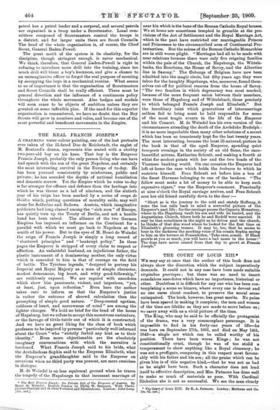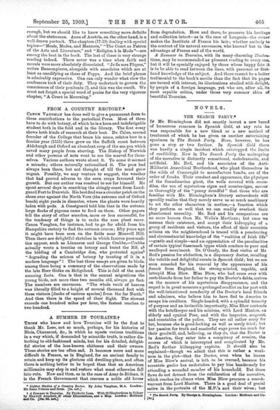THE COURT OF LOUIS XIII.*
WE may say at once that the author of this book does not always show the discretion which the subject imperatively demands. It could not in any case have been made suitable virginibus puerisque ; but there was no need to insert scandalous anecdotes which have no importance, historical or other. Doubtless it is difficult for any one who has been con- templating a scene so bizarre, where every one is devout and no one cares about conduct, to preserve the moral sense unimpaired. The book, however, has great merits. No pains have been spared in making it complete; the men and women of the time are lifelike as they are made to move before us ; we carry away with us a vivid picture of the time.
The King, who may be said to be officially the protagonist of the drama, was a very commonplace personage. It is impossible to find in his forty-one years of life—he was born on September 27th, 1601, and died on May 14th, 1643—a single act which can be called worthy of his position. There have been worse Kings ; he was not constitutionally cruel, though he was of too stolid a temperament to show anything like a Royal clemency; he was not a profligate, comparing in this respect most favour- ably with his father and his son; all the praise which can be given him is of this negative kind,—that he was not as bad as he might have been. Such a character does not lend itself to effective description, and Mrs. Patmore has done well to make so much of materials so poor. With Cardinal Richelieu she is not so successful. We see the man clearly
10s. Gd. net.]
• •
enough, but we should like to know something more definite about the statesman. Anne of Austria, on the other hand, is a well-drawn portrait. The chapters (17-19) dealing with special topics—" Meals, Modes, and Manners," "The Court as Patron of the Arts and Literature," and "Religion a la Mode"—are among the best in the book. The last of these is very strange reading indeed. There never was a time when faith and morals were more absolutely dissociated. " Je fis mes Piques," writes Bassompierre, alongside with anecdotes which are at least as unedifying as those of Pepys. And the brief phrase is admirably expressive. One can only wonder what view the confessors took of their duty. They undertook to govern the consciences of their penitents (!), and this was the result. We must not forget a special word of praise for the very vigorous chapter, "A Court in Mourning."











































 Previous page
Previous page